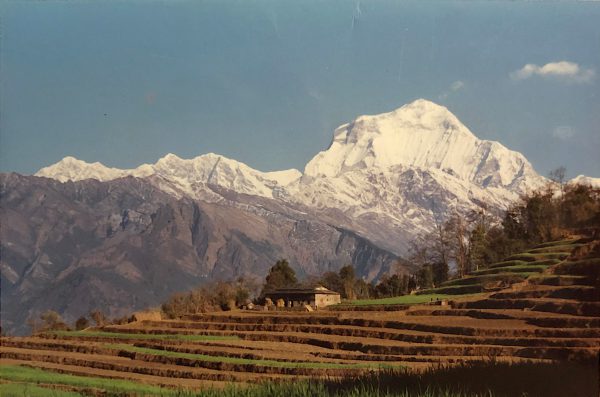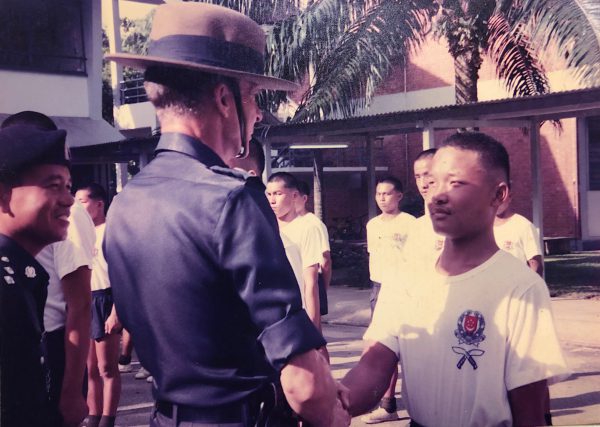When you meet Tilak Paija Pun, one of the first things you will notice is his broad grin and infectious laugh. He exudes positivity, even when reminiscing about some of the most challenging times in his life. We sat down with Tilak to learn more about his journey from a small village in Nepal to special officer in the Singapore Police Force to now a software engineer at Truveta. We came away with a better understanding of his passion for life, technology, and everything in between.
Let’s start from the beginning. Where did you grow up?
I grew up in a tiny mountainous village in Nepal, that was only about 90 households at the time. We had no TV, no electricity, no running water, and no technology of any kind. However, there was natural beauty. Every morning I woke up and saw the morning sun reflecting across this huge mountain range right in front of me. I still miss that view.
“I consider myself very lucky.”

Tilak’s childhood home, with Mt. Dhaulagiri in the background
What was your early education like?
The schools were started by former Gurkhas. (The Gurkha Contingent is a department of the Singapore Police Force.) They had gone out into the world, seen what was important, seen the value of education, and then started the school as a community project. Going to my school meant an hour’s walk through a forested area, and in any given month I would attend maybe two full days of actual class. I would study for the two weeks leading up to the exams and was still able to come out at the top of my class.
When you were a teenager, you were recruited by the Singapore Police Force to be trained as a Gurkha Officer. Can you tell us about this?
Once every year, the Gurkhas would come to our village to scout for recruits. I was too young to sign up, but I did it anyway. My dad had wanted to be a Gurkha, but never could become one. It was his dream to send his children to become Gurkhas. He was a very strict father, and I felt if I signed up, I would have some freedom. That was my main motivation.
What was the Gurkha training like?
It is one of the toughest military trainings in the world. In those 9 months, a young teenager from a village was transformed into an elite professional with military exercises that pushed me physically, mentally, and psychologically. There was no rest time during these days. It never took me more than 30 seconds to fall asleep once my head hit the pillow. These challenges allowed me to develop a sincere appreciation for the amazing capacity of a human body and mind to adapt.
“Anything I put my mind to, I give all of myself.”

Meeting the Commanding Officer upon arrival in Singapore
What has stayed with you from this time in your life?
The values of perseverance, persistence, and teamwork. They are ingrained in me. Doing military drills over and over until every one of us was perfect taught me the value of practice and the need to pay attention to detail. Having gone through extremely tough physical training that was designed to develop both physical and mental endurance helped instill a quiet confidence in me. I learned that with hard work and persistence, one can reach a destination that might have otherwise seemed unreachable. Lessons learned during that transformational Gurkha training have fundamentally shaped me as an individual and have proved invaluable well beyond my Gurkha life.
How did you start on the path toward becoming a software engineer?
After a grueling 9 months of training, I became a full-fledged Gurkha. I dedicated all my off-duty hours to learning, which opened a whole new world to me. I learned mathematics, English, and science on my own. That was also when I saw a computer for the first time. When I saw what it could do, the initial fascination was so strong, it has not died down even now. Once I could afford a laptop, I started to teach myself coding in C. I eventually sat for college admission exams and applied at the University of Idaho.
That is a big leap! Why University of Idaho?
I loved everything about Singapore, except the weather and especially the humidity. Where I’m from in the mountains of Nepal, it is cold. Here I was sweating all the time. I met a high school counselor and told him I wanted to go someplace cold where it snows. Idaho was his recommendation. I spent a year there before transferring to the Computer Science and Engineering program at the University of Washington.
What did you do after you graduated?
I spent time at a couple of different startups, which allowed me to grow as a full stack engineer. When someone from Truveta reached out to me, I saw the vision of “Saving Lives with Data” and that immediately felt like something I wanted to be a part of.
What keeps you motivated?
I get excited about learning new technologies to solve technical problems more elegantly; it makes me feel alive when I am learning. Besides technology, I also care about the human aspect of an organization. Friendliness and kindness really matter to me. I feel lucky that I get to enjoy the best of both worlds at Truveta.
What is your favorite part about working at Truveta?
It’s the people and the culture we have. I can feel positivity, focus, kindness, and respect at all levels of the organization. It’s a great feeling to be part of a group of co-workers who are all driven by this singular desire to contribute to the vision of “Saving Lives with Data.” I’m enjoying every moment.
